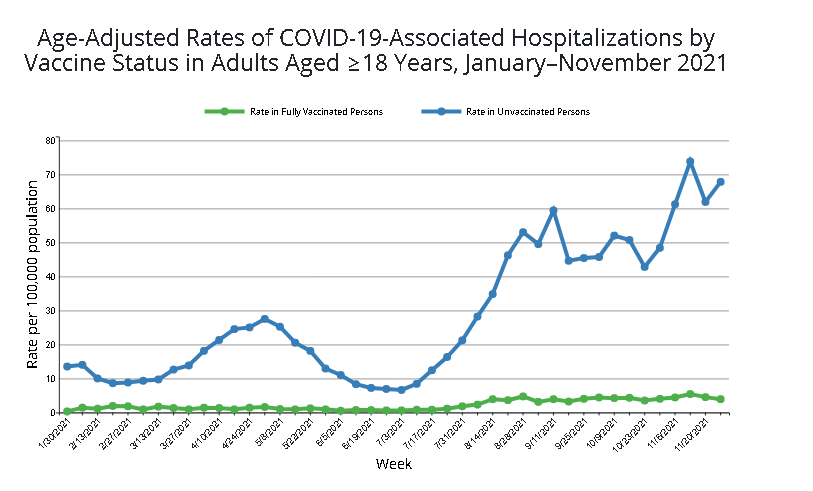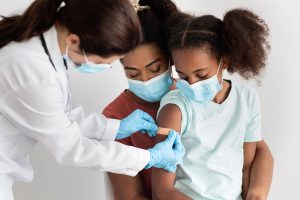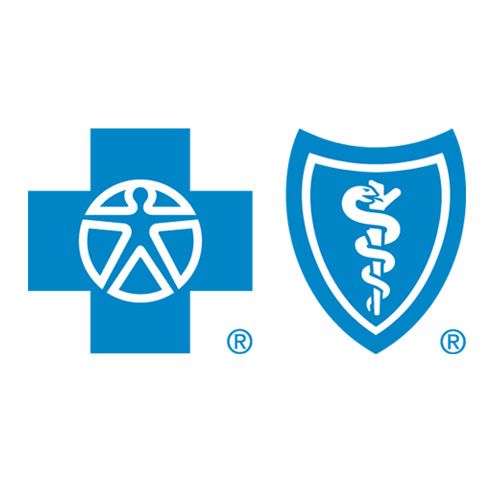Get the facts on omicron from our chief medical officer
January 12, 2022
Dr. Mark Steffen, vice president and chief medical officer at Blue Cross and Blue Shield of Minnesota, recently answered some of the most frequent questions that our members are asking about the latest strain of COVID-19.
The U.S. recently recorded 1 million cases of COVID-19 in a single day. How does this kind of spread impact the way we should be thinking about COVID-19 and the vaccines?
‘Omicron is everywhere,’ is something we will likely continue to hear for some time. It reached across the entire planet in about a month, resulting in more COVID-19 cases than at any other time during the nearly two-year course of the pandemic. Clearly omicron is proving to be much more contagious than previous strains. It may end up being the fastest-spreading virus in history.
Omicron also appears to be more vaccine-resistant than previous strains of COVID-19. While Pfizer and Moderna vaccines and boosters absolutely reduce your chances of initial infection, we’re seeing many more breakthrough cases among the vaccinated.
Does the rising number of breakthrough cases mean that the vaccines aren’t as effective as we thought?
No, quite the contrary. Preventing serious illness from COVID-19 remains the number one priority. Even if vaccines can’t totally prevent someone from getting a COVID-19 infection, they still provide vital protection against serious illness and hospitalization.
"If you’re fully vaccinated and have had your booster, you are far less likely to become seriously ill, no matter the variant."
If you’re fully vaccinated and have had your booster, you are far less likely to become seriously ill, no matter the variant.
There is a big distinction between overall case numbers and serious illness. Vaccine success means a lower rate of serious illness even when the rate of infections starts to spike. That’s exactly what we’re seeing with omicron.
As I discussed in another recent blog post about my son’s immunization, it’s very important to look at the difference in hospitalizations between vaccinated and unvaccinated individuals. This remains true with the omicron variant, and you can see from this chart the impact immunization has on preventing hospitalizations.

Source: CDC | COVID Data Tracker
Beyond vaccination, we need to remain vigilant when it comes to other preventive measures, including mask-wearing. It’s not just about protecting yourself but protecting those around you. Keep in mind, there are still individuals who cannot get vaccinated, including children under five years old.
Is there any more recent data on the difference between vaccinated and unvaccinated hospitalizations with the omicron variant?
The latest data I am looking at is from a major study in the UK, which analyzed more than a million COVID-19 cases in England over a recent four-week period. It concluded that while overall illness seemed to be less severe in adults compared to previous strains, unvaccinated individuals were still eight times more likely to be hospitalized with COVID-19, as omicron spread.
These findings are further supported by data from the World Health Organization, which showed a record increase in COVID-19 infections during the first week of January, coupled with a reduction in global COVID-19 deaths.
It’s safe to say that fully vaccinated and boosted individuals are less likely to get seriously ill from omicron, but everyone is more likely to experience a symptomatic infection than with previous strains, due to the highly infectious nature of the omicron variant.
For those who test positive for COVID-19, the CDC is now recommending a five-day quarantine period as long as symptoms are improving, followed by at least five days of mask-wearing in public. This does not apply to those who had severe illness or have weakened immune systems. Additionally, the CDC does note that if you have access to a COVID-19 test you may decide to test prior to ending quarantine.
So the data shows omicron is less severe in adults and fully vaccinated individuals. But what about young kids who are not yet vaccinated?
This is an area of concern across the globe and experts are still working to fully understand why the omicron variant is causing a rise in pediatric hospitalizations.
Certainly, the rise in the total number of cases is leading to a higher number of serious cases in young children, even if the rate of hospitalization (serious illness per infection) is not necessarily increasing.
There are also indications that this variant may present itself differently in young children, with some pediatric infectious disease doctors seeing more children with respiratory symptoms similar to croup. While treatable, croup can be a serious illness for young kids and parents should talk to their health care provider if they have concerns.
"I recommend parents bring their children in to get vaccinated (and boosted), once they are eligible."
Overall, it’s important to reassure parents that children still represent a small percentage of those being hospitalized with COVID-19. I recommend parents bring their children in to get vaccinated (and boosted), once they are eligible.
Of note, the CDC recently approved booster shots for kids 12 to15, and the timing for boosters of the Pfizer vaccine has been reduced to five months after the second dose.

When should we expect the vaccines to be made available for children under five?
Studies for at least two vaccines are ongoing so it likely won’t be until later this year. Both studies expect to submit their data to the FDA in the first half of 2022. While we all wish that timeline could be faster, health experts are taking the time necessary to ensure the safety and effectiveness of COVID-19 vaccines for everyone, including the very young.
In the meantime, everyone should continue working together to protect younger kids who can’t get the vaccine. The best thing older kids and adults can do is get vaccinated and boosted when eligible. It is also recommended that everyone age two and up who are unvaccinated wear masks in indoor public places to help prevent infection and further spread. Additionally, it is recommended that everyone two and up continue to wear masks in indoor public places where there is high or substantial spread of COVID-19. Right now, this includes the vast majority of the United States.
Anything else you’d like to add?
While it may seem like the ‘light at the end of the tunnel’ has faded, I am still optimistic about our ability to move on from this pandemic. In addition to the ongoing vaccination efforts, oral treatments for COVID-19 that have been shown to drastically reduce serious illness are being prepared to be distributed across the country now. More information will be coming soon on how people can access the oral treatments as availability increases.
As we continue forward, I hope to see vaccination rates continue to increase and death rates continue to decrease. To make that a reality, we must remain vigilant and ensure we are doing what is needed to protect ourselves and others, particularly those who are vulnerable.



I appreciate the information.
Thank you for the very informative interview with Dr. Mark Steffen. Many of the questions I had were answered!
Thank you BCBS for sending this update. It is very helpful to read a succinct run down of where we stand with the virus and what reasonable steps we should take to prevent being infected or infecting others.
If I have been exposed to someone with the virus, what should I do? I have no symptoms and have had all shots including booster shot
If you are fully vaccinated, have your booster shot and have been exposed to someone who has tested positive for COVID-19, the CDC recommends: No quarantine. You do not need to stay home unless you develop symptoms. Get tested. Even if you don’t develop symptoms, get tested at least 5 days after you last had close contact with someone with COVID-19. Watch for symptoms. Watch for symptoms until 10 days after you last had close contact with someone with COVID-19.If you develop symptoms isolate immediately and get tested. Continue to stay home until you know the test results. Wear a well-fitted mask around others. Take precautions until day 10. Wear a well-fitted mask for 10 full days any time you are around others inside your home or in public. Do not go to places where you are unable to wear a mask. Avoid travel. Avoid being around people who are at high risk. You can find more information here: https://www.cdc.gov/coronavirus/2019-ncov/your-health/quarantine-isolation.html
Excellent straight forward understandable information … thank you
That you SO MUCH for providing good information that also combats the plethora of misinformation out there. GOOD WORK!!!!
Excellent article. Thanks for the clear and concise information.
Thank you for sharing this information. We need to combat the extensive 'misinformation'…
A clear message is not easy in our polarized society!
Thanks for your response we appreciate it
When can I get vaccinated after testing positive and being (mildly) symptomatic? I have isolated for 10 days. My doc told me tests will show positive for three months following being ill. How will I know I’m virus free and no longer contagious? Guidance on these points is not clear.
According to the CDC, people with COVID-19 who have symptoms should wait to be vaccinated until they have recovered from their illness and have met the criteria for discontinuing isolation; those without symptoms should also wait until they meet the criteria before getting vaccinated. This guidance also applies to people who get COVID-19 before getting their second dose of vaccine. For more information, visit https://www.cdc.gov/coronavirus/2019-ncov/vaccines/faq.html Please contact your health care provider with specific questions about the timing of your vaccine.
Thanks for the updated information. Always nice to have someone with common sense inform the public.
Very insightful, it is good to get all the input you can from the professional people. I am a firm believer in the vaccine and had both shots and the booster. My wife has had the same. We both ware masks in public as well. Staying safe since we both have medical issues. Thanks again please keep the information coming
Thanks, Doctor Steffens, for the BCBS COVID update in layman’s terms. The confusion on TV has become political and I want information from the doctor’s mouth.
Should people try to have hydroxycloroquine or ivermectin on hand? Does it require a prescription? And why not? It’s over the counter in many countries.
Ivermectin IS NOT currently authorized or approved by FDA for treatment of COVID-19. In 2021, poison control centers across the U.S. received a three-fold increase in the number of calls for human exposures to ivermectin. For more information on severe illness associated with human use of products containing ivermectin, read https://emergency.cdc.gov/han/2021/pdf/CDC_HAN_449.pdf Please contact your health care provider for specific information regarding treatment options.
Very good information
Thank you so much for the clear picture of COVID-19. We hear so many differing opinions that it is good to have competent answers.
How long to quarentine after a positive test???
The CDC has a helpful chart about calculating quarantine time here: https://www.cdc.gov/coronavirus/2019-ncov/your-health/quarantine-isolation.html
I am not vacinated,I tested positive today. I have been self quarantened for over a week due to a cough and fatigue I have had a chronic cough for 4 years, fatigue since Oct, my hemoglobin is 5, temp 99 for over a week
Can I take ivermectin or hydroxicholoroquin to fight this or shortenen my isolation
Ivermectin IS NOT currently authorized or approved by FDA for treatment of COVID-19. In 2021, poison control centers across the U.S. received a three-fold increase in the number of calls for human exposures to ivermectin. For more information on severe illness associated with human use of products containing ivermectin, read https://emergency.cdc.gov/han/2021/pdf/CDC_HAN_449.pdf Please contact your health care provider for specific information regarding your condition and treatment options.
Is HP recommending a 4th dose of vaccine for the elderly and at risk populations? Is it available now?
We recommend you speak directly with your health care provider with questions about potential additional vaccine booster doses.
Thanks. This is a succinct and highly informative analysis regarding the Omicron variant and efficacy of current vaccine protocols.
What about positive cases that have recovered from the different types of covid. Can they get a different variant. Does vaccinations of these individuals help or is the natural immunity they have is enough
You should get a COVID-19 vaccine even if you already had COVID-19. You can find more information as recommended by the CDC here: https://www.cdc.gov/coronavirus/2019-ncov/vaccines/faq.html
DR STEFFEN– THANK YOU SO MUCH for taking the time to share your knowledge of the virus with us (shareholders). We need to be informed
and your informative email did the trick. I feel much more safer now
and can proceed to move toward a more "normal" life!
Thank you for this clear and concise summary of where we are in this pandemic. I have shared it with others.
As the grandparent of a 10 month old hospitalized for two months while awaiting a heart transplant, the information confirms my thinking and COVID related daily practices.
Thank you. I benefited greatly from this article. Reliable information is extremely important. Accurate information is in short supply. You answered all my questions in an easy to understand language. The graph about vaccines versus no -vaccinated is an eye opener!
I am a nurse fully vaccinated and I have not had Covid.
Many people will ask me or voice concern's about the safety of the vaccines. I would appreciate hearing your input on this so I can reinforce it. Thank you.
We refer people to the CDC site on vaccine safety and recommend that as a resource https://www.cdc.gov/coronavirus/2019-ncov/vaccines/safety.html
Thanks for the 'calm' but important info. The facts you presented are clear, helpful and quite consistent to what's being presented by scientists on actual news channels. Thanks.
I got my vaccinations last year in March, then 3 weeks later, then the booster in September or October. When should additional vaccinations take place? We get flu shots every year in the fall. Is this going to be similar? Is the next vaccine due in March of this year for me or after the booster was given?
The CDC currently recommends the initial two COVID vaccine doses plus one booster shot approximately five months after the end of your first shot series. Find more information here: https://www.cdc.gov/coronavirus/2019-ncov/vaccines/booster-shot.html?s_cid=11712:%2Bcdc%20%2Bcovid%20%2Bbooster:sem.b:p:RG:GM:gen:PTN:FY22 For information on any additional recommended booster doses or vaccine timing, please contact your health care provider.
What are your time recommendations for a 3rd vaccine after having covid?
According to the CDC, people with COVID-19 who have symptoms should wait to be vaccinated until they have recovered from their illness and have met the criteria for discontinuing isolation; those without symptoms should also wait until they meet the criteria before getting vaccinated. This guidance also applies to people who get COVID-19 before getting their second dose of vaccine. Talk to your medical provider about specific timelines related to your personal situation, but you can also find more guidance from the CDC here: https://www.cdc.gov/coronavirus/2019-ncov/vaccines/faq.html
Thank you for your straightforward information! It is what is needed. T
As a source that may reach a wider audience, I thank you for acting to provide factual health information.
I am wondering why an additional shot has not been recommended for the J7J "people". I received the J&J shot in March and the Pfizer booster in September, but I feel like I should really get a third shot. What do you think?
We recommend you speak directly with your health care provider with questions about potential additional vaccine booster doses.